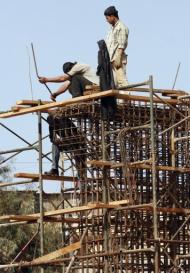 BEIRUT (AFP)
BEIRUT (AFP)
As political tensions gripped the country after the Hariri assassination and a series of political assassinations afterwards, economic and political conditions worsened. The Syrian workers often bear the brunt of the blame levelled at Syria, sometimes being targets for attacks.
"Since 2005, life here has become more difficult. Whereas before you could save two thirds of your salary, now you can barely make ends meet," said Joseph who usually earns 20,000 Lebanese lira (about 13 dollars) a day.
"When an assassination takes place here, most of us don’t dare leave home. Some of my friends even go back to Syria because they fear being attacked."
Lebanon’s political divisiveness can, in most cases, be mapped geographically, with certain areas considered loyal to the government, backed by the West and most Arab states, and others considered loyal to the opposition, backed by Syria and Iran.
Mazen has also felt the effects of this.
"Syrians are more picky about the areas in which they are willing to work. Like if I have a project in a given area and I ask the Syrian employee to come to work there, he’ll say: ‘No, no, no. I am not going to work there, otherwise I might get beaten’," explains Mazen.
"As a matter of fact, at one site I have 50 Syrian employees and one Lebanese guard from the area to protect them. Otherwise they might get attacked."
Many Syrians have been the victims of crimes, including beatings, robberies, the setting on fire of tents where they live, and even killings.
"Before [2005], you could walk around comfortably without any problems. Now, we don’t feel safe," said Khaled, who was beaten by a group of young men one day as he was walking down the street.
"I didn’t know who they were. They didn’t take anything from me. They just beat me up for no reason."
In spite of a lack of available information, Human Rights Watch (HRW) was able to document 12 beatings of Syrian labourers, seven knife attacks, three instances of tents being set ablaze, one incident where a Molotov cocktail was thrown on a construction site and seven violent incidents in which 10 Syrians were killed in 2007.
There is no way directly to link political motivation to the attacks, but there is a trend, HRW said.
"There is no doubt to me that Syrian workers in Lebanon are victims on both ends. They are victims of the tensions between Lebanon and Syria … and ultimately, they are the victims of their socio-economic conditions," says Nadim Houry, an HRW researcher in Lebanon.
"The question becomes: what do the authorities do about it?"
Prime Minister Fuad Siniora publicly expressed concern over the attacks on April 30 last year, strongly condemning them as "inhumane".
It is not clear, however, that this concern has translated into concrete steps taken by the security forces.
While there have been notable cases where the perpetrators are tried and penalized, many go unpunished.
"When my friends get robbed or have a problem, the police tell them: ‘You know how many other issues we have to deal with?’ So, we can’t really get help," says Joseph, who refused to give his last name.
"I would say we haven’t seen a serious investigation effort when it comes to attacks against Syrian workers," explains Houry. "That’s not necessarily unique to Syrians … It fits into the broader pattern of impunity in the country. Many people get away with murder, literally."
Despite the dangers and difficulties, most Syrian labourers take the risk and stay in Lebanon for the higher wages.
"Lebanese people are kind and generous. They are living under a lot of pressure too," says Joseph quietly.
"There are, of course, hoodlums who sometimes come after us. But we come here to make a better life for ourselves and our families like anyone else. Even if things don’t change, we need to stay to build our future. What choice do we have?"



